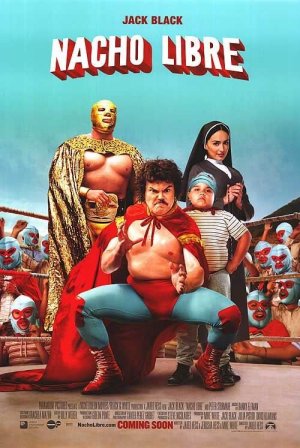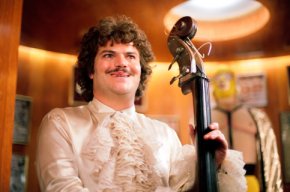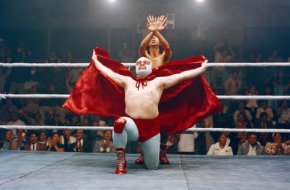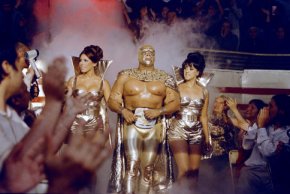As with Napoleon Dynamite, Hess' first film, many
scenes here are destined for repetition in schoolyards across
America. However, now it feels like a calculated move, creating
bits rather than story. In a movie like this with a supposedly
more rigid plot structure, it would have been nicer to try
and actually move the thin plot along.
Atmosphere has its place, and the film is loaded with
it. Nacho Libre uses mostly Mexican actors, adding
to the character. Apparently even the luchadores are authentic,
which may be the only thing about the wrestling world the
movie gets right. Hess also does do a good job of setting
up his story. In an opening credits montage, orphan Nacho
daydreams of being a luchador. Since such things are apparently
against God in this film's fuzzy Catholic teaching, the
Brothers at the Monastery put him to work as a cook.
Despite apparently being a lousy cook, they keep him on
and he grows up to be Black. Still, though, he hides crude
crayon drawings of his wrestling outfit in his missal. Furtive
glances at a suffering crucifix only slightly deter him
from his dream.
The script takes the untenable position of automatically
making Nacho a monk himself. Not a bad thing on its own,
but when a chaste love interest shows up, Sister Encarnacion
(Ana de la Reguera), all White and the Hesses can do is
go in circles with it.
They make jokes about how badly Nacho wants her, simultaneously
over the top and subtle since this is a Nickelodeon Film.
But anyone old enough to understand the relationship also
knows how dead end it is.
None of the relationships make much sense, though. Again
as in Hess' earlier film, major characters pop up with no
past and no motivation to stay in the picture, yet they
do. Nacho's tag team partner Esqueleto (Hector Jimenez)
makes a great foil in theory, but from start to finish,
we know nothing beyond his thinness and an obsession with
roasted corn.
Why does Esqueleto agree to wrestle? Why is he apparently
homeless in the beginning, leaping down from the rooftops
to eat scattered tortilla chips? For no other reason than
it should be funny, even, perhaps, whimsical.
The same goes for the luchador world. It all seems whimsical;
the script makes no effort to explain the hold it has on
Mexican culture (if, indeed, it still does). When wrestlers
try to unmask Nacho, it's enough, I suppose, to know that
he doesn't want the monastery to know who he is. The movie
never explains the great shame it would be in the luchador
world, nor explains why all the masked wrestlers walk around
in their masks all the time.
Younger children will eat it up like Esqueleto's corn,
though one scene randomly and disturbingly uses it as a
weapon, with no lead up or follow through. Just a bit that
cuts away too soon.
That might be part of the problem. In a lot of places,
Nacho Libre feels like it was made for a more sophisticated
audience, then clumsily hacked down to make it safe. The
corn as a weapon gag looks to be the only survivor of a
wrestling rivalry subplot. Character actor Peter Stormare
barely has time to affect a trademark outrageous accent
before being whisked off the screen, never to be referenced
again.
It's mediocre and messy, but inoffensive thanks to Nickelodeon's
participation. Prepare yourself for the bad Hispanic accents
that schoolchildren will be affecting next Fall, but don't
feel obligated to understand why it's happening.
Rating: 









